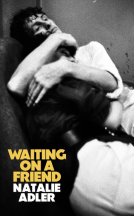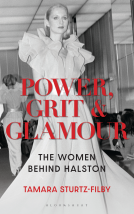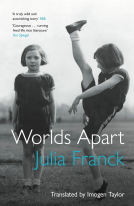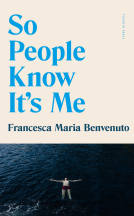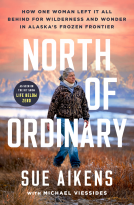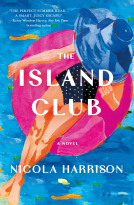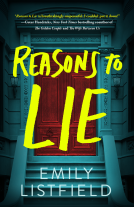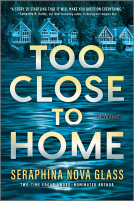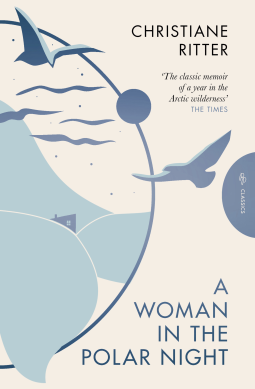
A Woman in the Polar Night
by Christiane Ritter
This title was previously available on NetGalley and is now archived.
Send NetGalley books directly to your Kindle or Kindle app
1
To read on a Kindle or Kindle app, please add kindle@netgalley.com as an approved email address to receive files in your Amazon account. Click here for step-by-step instructions.
2
Also find your Kindle email address within your Amazon account, and enter it here.
Pub Date Feb 06 2024 | Archive Date Nov 13 2023
Pushkin Press | Pushkin Press Classics
Talking about this book? Use #AWomaninthePolarNight #NetGalley. More hashtag tips!
Description
A rediscovered classic memoir – the mesmerizingly beautiful account of one woman's year spent living in a remote hut in the Arctic
“A refreshing voice in the canon of Arctic literature. . . charms its reader with its simple candor. Readers will delight in Ritter’s frank impressions and candid remarks. – The Wall Street Journal
This rediscovered classic memoir tells the incredible tale of a woman defying society's expectations to find freedom and peace in the adventure of a lifetime.
In 1934, the painter Christiane Ritter leaves her comfortable life in Austria and travels to the remote Arctic island of Spitsbergen, to spend a year there with her husband. She thinks it will be a relaxing trip, a chance to 'read thick books in the remote quiet and, not least, sleep to my heart's content', but when Christiane arrives she is shocked to realize that they are to live in a tiny ramshackle hut on the shores of a lonely fjord, hundreds of miles from the nearest settlement, battling the elements every day, just to survive.
At first, Christiane is horrified by the freezing cold, the bleak landscape the lack of equipment and supplies... But as time passes, after encounters with bears and seals, long treks over the ice and months on end of perpetual night, she finds herself falling in love with the Arctic's harsh, otherworldly beauty, gaining a great sense of inner peace and a new appreciation for the sanctity of life.
Available Editions
| EDITION | Other Format |
| ISBN | 9781805330899 |
| PRICE | $19.95 (USD) |
| PAGES | 224 |
Available on NetGalley
Average rating from 32 members
Featured Reviews
 Stacey K, Reviewer
Stacey K, Reviewer
A Woman in the Polar Night is a beautifully written memoir from the 1930’s about Christiane “Chrissy” Ritter going to the arctic to spend time with her husband. She is warned about leaving Austria and spending time at an island in the Arctic. She is told that it is no place for a woman and warned by family, friends, and even people she passes by on her travels that she should not go.
This memoir is so fascinating. The “drama” is nature and Chrissy’s battle with surviving in the depressing landscapes. Ritter paints a vivid picture of the arctic and the icy, frozen, and foggy wilderness on these pages. Watching her transform her thoughts from arriving and not being thrilled with how she is introduced to her staying there to finding beauty and connection in nature and means of survival makes A Woman in the Polar Night seem like art.
“To paint this landscape would require the devotion of the old masters. Perhaps this habit of devotion will one day be recaptured.”
I do think that it is important to mention that there is sexism and hunting for food and fur involved. Ritter talks about this in a way that aligns with the time it is written. She is explaining her lived experiences when writing this and sexism is not the focal point of this book. Hunting is used for survival and combatting a limited food supply in an area with limited access to buying goods and services and poor land for growing – 4 stars.
Huge thanks to the publisher for allowing me to access A Woman in the Polar Night on NetGalley! I may not have ever found this to read if I had not noticed it there.
Beautifully written and haunting, A Woman in the Polar Night is Austrian Christiane Ritter’s memoir of her year spent at the edge of the Arctic. In 1933, Ritter joined her husband Hermann who had travelled there on a scientific expedition and stayed on. She planned to read and sleep but she had to learn how to survive in the bleak Arctic which she had thought of as “another word for freezing and forsaken solitude.” She was right and she learns quickly that survival is based on your ability to hunt, to kill, cook and build a fire. The hut where she lives is basic. The private room she was promised has not yet been built. There is much disappointment but she finds beauty in the wild and lonely landscape. Ritter’s descriptions of light “there’s so much artificial glitter that the people no longer know anything about the light, about its coming and going, and about the magic of the twilight” and the sun “ rises over the horizon, irradiating a superb scene of precipitous, bright red cliffs” are magical and poetic. There are photographs of the couple and their snow buried hut which only emphasize the crazy bravery of this year in the Arctic.
As you read A Woman in the Polar Night and marvel at Ritter’s words and drawings, you forget that it was written in 1933. Her husband and the other hunters would be called sexist in today’s world. While the couple hunts, fishes and builds bear traps, her country is facing war. She will return to a very different Europe. She has learned much about herself and how the Arctic has changed her. “You must live through the long night, the storms and the destruction of human pride. You must have gazed on the deadness of all things to grasp their livingness. In the return of light, in the magic of the ice, in the life-rhythm of the animals observed in the wilderness, in the natural laws of all being, revealed her in their completeness, lies the secret of the Arctic and the overpowering beauty of its lands.” 5 stars.
Thank you to NetGalley, Pushkin Press and Christiane Ritter for this ARC.
 Laurel L, Reviewer
Laurel L, Reviewer
Note: I received an ARC through NetGalley, and the passages quoted may not be in their final forms.
"A Woman in the Polar Night" is a gripping autobiographical account of life in what is now known as Svalbard, written by Christiane Ritter. Originally published in 1938, one would expect a certain degree of datedness in an 85-year-old text, but to the contrary, it feels remarkably fresh and relevant. With the rise of the 'cottagecore' and 'slow living' movements, this book's central themes of self-sufficiency and living close to nature feel particularly timely.
Ritter's writing style keenly reflects the extremity of her situation, vacillating between the stark, chilling portrait of the landscape and the poetic profundity of her inner contemplations. The language, translated from German, is intimate, almost dreamy, making the reader feel as though privy to Ritter's personal diary. The pacing is perfectly suited to their situation - long spells of waiting are broken by sudden onslaughts of terror or beauty.
"Do we really need the force of contrast to live intensively? It must be that. For a gentle song would not shake us if we had never heard a loud one."
I found Ritter's poetic yet unadorned narrative style as well as her short but powerful chapters gave the novel a timeless appeal. It is a novel that is easy to pick up but hard to put down, especially so as we head into the winter season. Fans of memoirs, philosophy, and nature, as well as those seeking a deeper understanding of a life pared back to its rudiments, will find much to appreciate in these pages.
I look forward to giving this book a re-read when this new edition is released in February!
I don't think I'd ever heard of this book despite being a big fan of nature writing, winter, and isolation--what a pleasure it was to read.
The book was written ninety years ago by a woman who decided to spend a winter in the remote north with her husband, who apparently had been living there for some time without her. Not until she's underway does she learn that another man will be living with them. The human relations among the few people in the area (the closest neighbor is sixty miles away by non-motorized means) are intriguing, and she also spends a lot of time alone and writes about it well.
But for me, the descriptions of the arctic weather and wildlife are the best aspects of the book. Not completely knowing what to expect going in, she winds up realizing that a life lived without a connection to nature is a lesser life.
Having lived in Yellowstone for a few years, I was able to relate to her described experiences in small ways--hiking alone in winter with no human sounds, and the transitions of going back and forth between busy human-centered life and a life more attuned to the natural cycles of the world.
Thanks to Pushkin Press and NetGalley for the chance to read an advance copy of this edition.
This was a fascinating tale about living in The Arctic in the 1930's. As you read A Woman in the Polar Night you feel as if you were there as well. I felt like i was apart of this memoir because Ritter’s words and drawings pull you in and you forget about your own life.
Thank you for this ARC
All thoughts and opinions are my own and aren't influenced by anyone else
 Amy B, Librarian
Amy B, Librarian
In the late 1930s, Austrian artist Christiane Ritter joined her hunter-trapper husband Herman for a year-long expedition in the Arctic wilderness. Along with their friend Karl, the couple brave extreme darkness, cold, and snow, and cope with the constant need to find fresh seal or bear meat. Christiane mostly keeps herself busy transforming their tiny hut into a sparkling home.and holding down the fort while the men are away. With her painter’s eye, she discerns the wild beauty of untamed nature. When the big boat arrives to take the adventurers back to Europe, none of them really want to leave their beloved Spitsbergen.
Given the subject matter, I thought this memoirs might be a fast paced adventure tale, but it is not. Recommended to those who like meditative nature memoirs.
This is an astonishing book. It's so matter of fact about something so incredible and brave and frankly insane. I loved everything about it. I couldn't believe that anyone so ill equipped could just step away from all comfort and spend an entire year in a filthy, fragile shack with a failing stove anywhere, let alone in the Arctic. Even today, with cell phones and satellites, technical clothing and all kinds of ways of preserving food, it would still seem fairly bonkers. In 1934 it's nothing short of insanity. Ritter is a brilliant narrator. She has a fantastic eye for detail, a great sense of humour and the ability to tell you all the things you want to know. My only sadness was that it was too short.
 Emma O, Reviewer
Emma O, Reviewer
"Why have I been so shaken by the peacefulness of nature? Because it was preceded by the titanic storm? Do we really need the force of contrast to live intensively? It must be that. For a gentle song would not shake us if we had never heard a loud one."
In July 1933, Austrian painter Christiane Ritter set out for the Arctic. Persuaded to meet her husband, Hermann, on the Norwegian island of Spitsbergen, she travels north by boat with no more luggage than she can comfortably carry in a rucksack. Joined by Hermann's friend Karl, they set up camp in a small hut on the island's remote north coast. Their closest neighbour lives 60 miles away; temperatures drop to -50; and several months of the year are spent in complete darkness.
A Woman in the Polar Night, first published in 1938, is Ritter's memoir of a year spent living in one of the world's most isolated environments. It's an account of human endurance in harsh (and often unbearable) conditions, but also a love letter to the beauty of the Arctic. There isn't any great drama here, but somehow even the most mundane tasks - brewing coffee, baking bread, and doing laundry - make for exciting reading. Some of the most interesting chapters are those where Ritter finds herself alone for several days at a time and is therefore forced to navigate new challenges on her own.
The writing is quite restrained in places (e.g. when it comes to detailing personal information or relationships), but Ritter's descriptions of her surroundings are captivating. Landscape, climate, and nature - and how they change throughout the year - are all depicted in an almost painterly style:
"The sun is following its shallow course behind the mountains in the west, and the magic of the bright Arctic night surrounds us. Once more it seems to me a miracle that the evening twilight does not fade on the horizon, as it does at home, but slowly, little by little, again ascends, trailing with it over the mountains a streak of pastel-blue night."
This is one for fans of travel and nature-writing, but be aware there are some graphic descriptions of hunting. Thank you to NetGalley and Pushkin Press for the chance to read this new edition.
I received this book as an ARC via Netgalley in exchange for an honest review. Many thanks to the translators and publisher for this opportunity.
What a treat to read a translated classic.
#NetGalley #AWomaninthePolarNight
#netgalleyreviewer #netgalleyreader
 Mariechen P, Reviewer
Mariechen P, Reviewer
I have a huge love for books of wilderness adventures. It probably started with Hatchet, but has grown to ESPECIALLY books of discovery and exploration by women. A Woman in the Polar Night is exactly that. Although I have never been to the Arctic - and probably never will - there is something both pure and relatable about her initial misgivings of, and her evolving love for, the polar region. The prose is sparse: not overly lyrical, it avoids unnecessary frills, while remaining evocative of a region loved by so many.
I would definitely call this essential travel reading.
 John L, Reviewer
John L, Reviewer
A text much more well-known in German markets, this is being reviewed in honour of a rejigged Pushkin Press cover and packaging, due early 2024. The piece is the only literary output of a well-to-do Austrian woman, who somehow married a chap who loves nothing more than spending winters on Spitsbergen in the far Arctic north. When he says she would do well to follow him for a season, she does. And so the book conveys first how very different she is from all the 1400 people on the cruise ship taking her there – and slowly shows that woman becoming someone else indeed in turn. Their hut is little larger than a shed, the stove blackens everything (to the extent their playing cards are all black suits), the trials and tribulations of the year depend solely on the whims of the weather and the animals they need to hunt, and the husband doesn't let her know until the last minute there will be a second bloke living there too.
Pleasantly descriptive writing, that doesn't over-do the colours, skies and senses, the sheer drama of the place (embodied by the photos of the shack in summer and then completely swamped by winter snow drifts) and of course the climatic extremes all feature nicely. The piece is just plain reportage, not over-doing the "reader, I found myself", not pushing this sentiment or over-egging that aspect of it all, merely defining the year for herself and on a casual basis for anyone else who may have been interested. If there is any 'side', it's a later thought that has a kind of feminist bent – that in European villages women are worried about fresh food and smuts, and she is too – but in an unearthly wonderland, therefore who not try it on for size yourself? Oh, and that it's not the frozen hell of ordeal after ordeal other previous writers had made out. You'll see no trace of someone pushing themselves unnecessarily, just stoically seeing how life works up there and getting on with it – and yes, some of the potential audience will dislike all the facts of the huntsman's lot. The rest of us will see how this has gained a certain easy renown in appropriate circles.
A Woman in the Polar Night is a slight book with a powerful punch. It's a classic memoir, an engrossing account of Ritter's year spent living in a remote hut in the Arctic. Set in the mid 1930s, it follows Ritter's decision to leave her comfortable life in Austria, and travel to the remote Spitsbergen, where she lives with her husband in a ramshackle hut. Here, Ritter tries to survive the brutal, yet beautiful, Arctic winter.
It's the adventure of a lifetime, and yet is the single most difficult thing Ritter has ever done. Bears, seals, ice, perpetual night, solitude, and deep peace, all combine to create the most incredibly life-affirming account of one woman's attempts to transcend the limits of her life. I absolutely loved this, and was transported all the way to the far north, living and breathing through all the terror and triumphs that Ritter faces.
Wow, this was a phenomenal read. I can't believe this is my first time ever hearing of this memoir, but I am so glad I picked it up. The prose is absolutely incredible and as someone who lived and worked in the arctic year round, I found this story really resonated with me. Don't get me wrong, I don't think you have to live in the arctic to appreciate this, but she put in to words what my heart has always felt. I still feel the call to that strange world, and I will cherish this memoir forever and make sure that it becomes common reading in my household.
Thank you to NetGalley and the Publisher for this ARC.
This short read is a classic memoir, an account of a year spent in the Arctic by Christiane Ritter.
In 1934, Christiane left her comfortable life as a painter in Austria to join her husband, who had always dreamt of living in the Arctic. She soon abandoned her hopes of a quiet life and long reads as she arrived in a tiny, cluttered, dirty hut on a remote island. Terrified of the loneliness, the weather and the insufficient supplies, she questions her decision. Gradually, she learns to appreciate the harsh beauty of the Arctic…
This book is a true story of survival and change. Written in simple but beautiful language, it relates a story that could be a base for a novel or a movie. It presents the harsh life of the hunters in the Arctic through the eyes of a European woman used to relative comfort, but it also praises the beauty of wilderness. It was a fascinating read.
Just as enchanting the second time around!
Written in 1934, A Woman in the Polar Night is Christiane Ritter’s account of a year spent in a hunting shelter on the island of Spitsbergen in the Svalbard archipelago of northern Norway. The visit was her husband’s idea, and for years she laughed her decline. But she changes her mind on page one, and the adventure begins.
The hut is located between Misery Bay and Distress Hook, and looks like “a tiny box thrown up by the sea.” It is surrounded by skeletons, skis, tubs, and a post to lure the polar bears that arrive with autumn’s pack ice. Christiane jokes that she will make pets of the bears: Hermann doesn’t laugh. He teaches her how to shoot: in the chest first, then through the brain.
Everything is about survival. Her nearest neighbour is sixty miles away, and water for that first coffee takes an hour and half to find. Mist drifts in through the window. Later, ice forms on the interior walls.
Ritter’s writing is lean, each word essential as polar kit. She is a cool-headed observer, and the absence of ego and spin gives her account an enchantment and freshness that sets it apart from the modern misery memoir.
That said, there is a moment with Mikkl - surely one of travel literature’s most endearing creatures - that is nerve-wracking and had me sniffing and blinking fast.
Five stars. I’ve read A Woman in the Polar Night twice and was just as affected by Christiane’s adventure and Mikkl’s charm the second time around.
What marvellous fun. I've been meaning to read this for years (I love me a good off-into-the-frozen-wilds real-life adventure story), but I'd been putting it off because I'd gotten it in my head that it would be a serious, grim account of survival in those frozen wilds, and instead it's...well, the words that kept coming to mind as I read were things like "marvellous", "delightful", "plucky", and "smart".
Ritter was an Austrian painter, and this is her only book—an account of the year she spent with her husband on the island of Spitsbergen, which is far, far, *far* north in Norway. It was the 1930s, and this was the sort of adventure that was acceptable for men (her husband had been in Norway for several years at that point) but not for women. Pretty much everyone she knew advised her against going, but her own expectations were perhaps a bit...rosy:
"The little winter hut appeared to me in a more and more friendly light. As housewife I would not have to accompany him on the dangerous winter excursions. I could stay by the warm stove in the hut, knit socks, paint from the window, read thick books in the remote quiet, and, not least, sleep to my heart's content." (loc. 145)
Her husband writes, devoid of irony:
"It won't be too lonely for you because at the northeast corner of the coast, about sixty miles from here, there is another hunter living, an old Swede. We can visit him in the spring when it's light again and the sea and fjords are frozen over." (loc. 153)
And so off to Norway she goes, and is swiftly disabused of her original romantic notions.
"I look round for a bed. I am seized by a secret horror of the two bunks with their hard straw mattresses. Who knows what wild hunters last slept there.
'Where is the boudoir you promised me in your letter?' I ask my husband.
'It's not built yet,' he replies. "First we have to find planks. The sea sometimes throws them up.'" (loc. 454)
But for every moment of well-bred horror that she has, she finds many more moments of beauty and awe. There's the fortnight when she's left alone in the hut and the first big storm comes, and she finds herself digging the hut out day after day, hoping that her husband is safe and trying not to think too much about the alternative—and she gets on with it, because what is the alternative? There are the mildewed clothes that she finds under a mattress and, after investigating their provenance, chucks into the sea. There are the months of unending darkness, and the weeks when they wait and hope for the ice conditions to change to improve hunting. If she despairs, she rarely lingers in it, and instead dives back into new experiences and new lessons and the beauty of their frozen isolation.
It's worth noting that one of the major points of this Arctic adventure was to trap and hunt for fur—something that has fortunately gone out of fashion. I've been vegetarian since I was four and cannot imagine hunting, especially for something under so much threat as polar bears; the attitudes toward hunting have to be taken within the context of the book's time. But it says something about Ritter's writing that by the end of the book even I (well, part of me) was hoping(!) for a polar bear for Ritter and her husband.
The book has never been out of print in Germany, and someday I'd like to try a reread in the original German. 4.5 stars.
"How varied are the experiences one lives through in the Arctic. One can murder and devour, calculate and measure, one can go out of one's mind from loneliness and terror, and one can certainly also go mad with enthusiasm for the all-too-overwhelming beauty. But it is also true that one will never experience in the Arctic anything that one has not oneself brought there." (loc. 1297)
Thanks to the publisher for providing a review copy through NetGalley. Quotes are from an ARC.
 Darlene M, Reviewer
Darlene M, Reviewer
The memoir is a reprint from the author. Fascinating description of a year in the polar arctic. Enjoyed reading of the desolation and beauty as well as the ingenuity and struggles of life under severe circumstances.
This is a beautifully written nature memoir of am incredible year in the life of and incredible woman. So evocative of the Arctic landscape, colours, wildlife and seasons this was pure escapism for me.
Whilst this account was brutally honest about the basic living and hard conditions there was a romance in the wooing of the environment which Ritter felt leading her to have an emotional attachment that it is clear will stay with her forever.
This honest review is given with thanks to NetGalley and the publisher for this book
 Librarian 705637
Librarian 705637
A Woman in the Polar Night is a gorgeous memoir by Christiane Ritter about her year spend in a tiny cabin on Spitsbergen with her husband and another hunter. She's funny, smart, and writes beautifully about nature and isolation. I'm devastated she never published anything else, so will just have to return to this book again and again.
 Reviewer 494590
Reviewer 494590
An extraordinary memoir of an artist who agreed to spend a year with her husband, Hermann, in Spitzbergen, a remote island in the Arctic Circle. Initially she thinks it will be a cost year of isolation allowing her to read and paint, but the realities of life in such a harsh environment quickly settle in. She very soon learns to love the place, and we get beautiful descriptions where she paints it with an artist's eye.
*Many thanks to Netgalley and the publishers for a review copy in exchange for an honest opinion.*
This is not an easy book for me to review. I love stories of adventure in harsh places, and the fact that it was written by a woman made it even more appealing to me, as most such stories are told by men. Christiane Ritter's style is beautiful, she skillfully captures the majesty and stunning nature of the Far North. Her perspective and sensitivity is strikingly modern, and when applied to the brutal realities of a subsistence hunter's life, it was sometimes too much for me to bear.
If you have similar issues with reading about animal suffering, this may not be the book for you - but you will be missing out on something very original and powerful.
Thanks to the publisher, Pushkin Press, and NetGalley for an advanced copy of this book.
 Brandy W, Reviewer
Brandy W, Reviewer
"A Woman in the Polar Night" by Christiane Ritter is a captivating memoir that transports readers to the unforgiving beauty of Svalbard. Ritter's vivid prose vividly depicts the challenges and wonders of life in the Arctic, offering valuable insights into the human spirit and the natural world. While the pacing may feel slow at times, the book's introspective reflections and historical context add depth to the narrative. Overall, Ritter's memoir is a compelling read that will leave readers spellbound by the allure of the polar wilderness. Highly recommended for those seeking adventure and a deeper understanding of Arctic exploration.
 Anne C, Reviewer
Anne C, Reviewer
Written in the 1930s this real life account of living for a year in the artic circle is mesmerising.
There are words in the local languages for going mad in the 24 hour darkness and doing things like walking into the sea. But as well as the bleakness and struggle for survival there's the beauty.
I found most compelling the peace whilst Europe gears up for WW2, although they get a clue from their one newspaper a year or so.
Content note there is hunting for food and for fur.
Thank you to Netgalley, the publisher and the author for a free copy in exchange for an honest review.
What a great read! If you enjoy the natural world as I do. then this read will greatly inspire you as the author goes on a journey to explore the harsh but incredible Arctic. Its pages are well written accounts of life where many cannot survive, and I felt her journey was a great read for the wintertime!
Thank you to Netgalley and the publisher for this arc.
"A Woman in the Polar Night" by Christiane Ritter is a stunning and profound memoir that transcends the typical adventure narrative, offering readers a deeply personal and poetic exploration of the Arctic wilderness. Written with clarity and depth, Ritter recounts her experiences living in the remote Arctic region of Svalbard for a year, a choice that was as unconventional as it was transformative.
Ritter's prose is captivating and immersive, drawing the reader into the vast, icy landscapes of the polar night with vivid descriptions that are both beautiful and haunting. Her reflections go beyond the mere physical challenges of surviving in such an unforgiving environment; they delve into the psychological and spiritual awakenings that come from profound isolation and communion with nature. Ritter paints the polar landscape not just as a backdrop to her adventure, but as a character in its own right, full of mystery, power, and beauty.
What sets "A Woman in the Polar Night" apart is Ritter's introspective journey and the philosophical insights she offers on solitude, resilience, and the human connection to the natural world. Her observations are thoughtful and introspective, exploring the depths of human experience with a sensitivity and wisdom that is rare. Ritter challenges the reader to reconsider their relationship with nature and the modern world, highlighting the stark contrast between the simplicity and richness of life in the Arctic with the complexity and often emptiness of urban existence.
The memoir is not just a tale of survival but a testament to the transformative power of nature. Ritter's account of her year in the Arctic is a journey of self-discovery and renewal, offering lessons on the importance of slowing down, observing, and being present in the moment. Her resilience and adaptability, coupled with a deep appreciation for the beauty and majesty of the polar landscape, make for an inspiring and compelling narrative.
"A Woman in the Polar Night" also touches on themes of environmental conservation and the impact of human activity on pristine wilderness areas. Ritter's love and reverence for the Arctic environment serve as a subtle but powerful call to action for the protection of such wild places, making the book not only a personal memoir but also a poignant environmental statement.
In conclusion, "A Woman in the Polar Night" by Christiane Ritter is a beautifully written and deeply moving memoir that offers much more than an account of Arctic exploration. It is a reflective and inspiring exploration of the human spirit, the power of nature, and the profound impact of solitude and wilderness on the soul. Ritter's experience in the Arctic is a compelling reminder of the beauty and fragility of our natural world, and her book is a must-read for anyone who seeks to understand the deeper connections between humanity and the environment.
Imagine your husband decides to go live on a remote island in the Arctic and after a few years you decide to see what the fuss is about and leave your home in Austria to spend a year with your husband Svalbard - the Norwegian Arctic.
That is what Christiane Ritter did in 1934. While the circumstances leading to her adventure are fascinating, this memoir is about how her Polar year and how it impacted her. You can tell Ritter is an artist by the way she vividly describes her new and changing landscape. I could see Svalbard perfectly in my mind and I could feel the extremes highs and lows of life in the Arctic. This was such a cool memoir and felt way ahead of its time.
Thank you to NetGalley and Pushkin Press for the advanced reader copy.
Readers who liked this book also liked:
Isabel Klee
Biographies & Memoirs, Nonfiction (Adult), Travel
Patti Eddington
Biographies & Memoirs, Humor & Satire, Parenting, Families, Relationships
